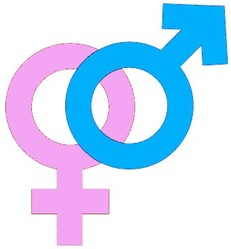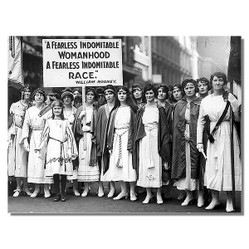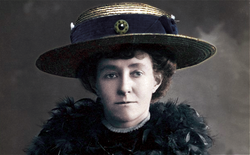I would argue that, to stay true to its goals of gender equality, feminism must actively challenge the ways in which our culture elevates masculinity over femininity, treating femininity as inferior.
Ironically, and very unfortunately, it is common for feminists and feminist rhetoric, to play right into the culture of placing masculinity over femininity, reinforcing it rather than breaking it down.
Chelsea Forbes-Terry writes about this in her piece The Shame of Being a Feminine Feminist, and Anne Theriault writes a more actionable piece We Need To Stop Devaluing Femininity.
I would go even farther than these authors, also examining the ways in which feminism and feminists approach the topic of communication patterns and styles. Feminism rightly recognizes a greater tendency in our society for men to use aggressive, domineering communication styles, often talking over women and sometimes taking credit for ideas that women came up with. But unfortunately, feminism sometimes falls into the trap of advocating for women to adopt this very same pattern itself.
The mainstream impression of feminist dialogue is one characterized by a communication style that is angry, aggressive, and often cold, almost a caricature of the "toxic masculine" patterns of femininity. I would argue that feminism won't truly achieve gender equality until it starts emphasizing the importance of interpersonal warmth, empathy, listening, and the showing of respect in communication, all characteristics of stereotypically "feminine" speech.
Summed up in a little tagline, I think we've passed the point of needing to teach women to become more like men, I think we now need to teach men to become more like women too.




 What is Genderqueer or Non-Binary Gender?on 10/16/2015
What is Genderqueer or Non-Binary Gender?on 10/16/2015
 Resources for Learning Spanish Free Onlineon 04/13/2016
Resources for Learning Spanish Free Onlineon 04/13/2016
 Ways Native Plants Can Help Control Invasive Plantson 05/26/2016
Ways Native Plants Can Help Control Invasive Plantson 05/26/2016
 What is a Sedge? How is it Different From a Grass?on 08/11/2015
What is a Sedge? How is it Different From a Grass?on 08/11/2015



What do you think? Share your thoughts!
I think this is a different issue that you're bringing up, which is the issue of the changing etiquette surrounding gendering people in public (i.e. assigning people mentally to gender categories).
There's no consensus in society currently, about how to handle this, and different people sometimes advocate for, or even demand, competing treatments, making this stuff seem hard to navigate.
My personal view is that I think it's fine to have an open conversation about how to refer to a person...but that the key aspect is that it's coming from a place of respect. So like, if you're thinking: "I'm not sure if that person wants to be treated or addressed as female, male, or gender neutral." I think that's good and respectful, especially if you're open to being corrected by the person and then you accept whatever the person says without arguing with them. This approach works well for everyone--whether cis or trans, whether binary or nonbinary.
I think the "is that a guy or a girl?" thing can get a bit rude for multiple reasons, but...it depends on the context. I think part of the reason people object to this is that it's making an "essentialist" commentary, i.e. what a person "is" rather than acknowledging the subjectivity of our own gendering of someone. It also erases nonbinary and intersex people. And it can be problematic for trans people too.
I have people speculate about me that way from time to time. I've had people stumble over addressing me as "sir" and "ma'am" and I have gotten both "Sir I mean ma'am" and "Ma'am I mean sir". I often find it funny. I think it stops being funny only if people start treating me with disrespect.
With respect to bearing children, giving birth, and all those things, I think it's important to remember that not all people with female bodies choose to identify as female, and some of those people who identify other ways, still end up having their own children. I've spoken with some of those people who get frustrated that all of the support networks and structures and literature in society is so strongly gendered, i.e. it's all geared towards women, talking about "womanhood", and framed in stereotypical ways of how women tend to want to support other women. So like, a transmasculine person might feel lost in this whole process -- they want support, they want guidance, they may want medical care, but they don't want to be treated "as a woman" through the process...with all the baggage that comes along with it.
cazot,
Interesting article, I enjoyed the video as well. I experience an even deeper aspect to this phenomenon. This maybe far from your point but something I feel falls into the same topic of discussion.
I find more and more females grooming and dressing like men and yet they are offended if you identify their gender, even in a normally acceptable manner.
For example, I was shopping for glasses at the mall with my daughter, we both had an eye exam and were buying new glasses. A, what I guessed to be a young woman, approached us asking if we needed help, we told her we were picking out new frames. When she walked away I leaned into my daughter, whispering in her ear, "Is that a male or female?" My teenage daughter was aghast, she said in a embarrassed whisper, "Mom you can't say that."
I responded, "say what?" She said, "Shhhh I'll tell you later." What I figured out privately, was a female (obviously acting like a man) waited on us, talked A LOT on and on, thought she would never shut up so we could get out of there. NOW now, I say acting like a man because it's obvious when a person is trying to hard to be something they are not, it is a basic sense we all have and this "person" was doing just that.
When out of the store I told my daughter, "SPILL!" She explained to me that it is unacceptable to call a person boy or girl because that is identifying their gender and we are not allowed to objectify another human being like that ." I laughed, "Oh my this generation is in for some hard road ahead, life is not a feelings fest, you deal with all sorts of people and it is vital to have thick skin." She said, "I agree Mom."
The thing is this, successful people don't waste time with silly things, I'm a product of the 80"s and we have a saying, "F the dumb Shat" and this (to me) is dumb shat... There are far more vital topics to lend our energy in MHO.
I saw the struggle my Mother and her peers faced the blood, sweat and tears they sacrificed to earn the rights and privileges we now enjoy. .
A man does not nor can not choose to give life, it is a woman who makes the ultimate choice to carry and give birth. I think it prudent society respect the priceless role women play and give credit where credit is due...
Male and female, masculine and feminine, are complementary and should be in a harmony of mutual love and respect.